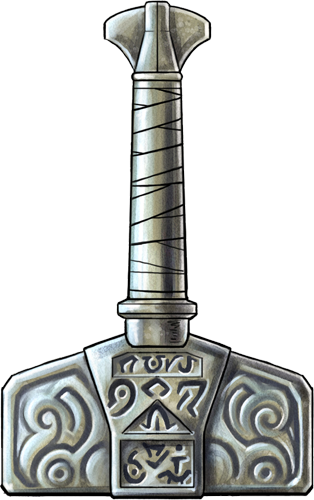Gungnir
The Anvil-Father
Gungnir is the god of dwarves, the forge, and unwavering honor. Stoic and solemn, he is the silent pillar at the heart of dwarven culture. A god who lends his strength without softening his hand. He forged not only the first dwarves, but also the Celestial Mountain, the divine peak upon which many gods now dwell. Though he rarely intervenes, his presence is felt in every clang of hammer on steel, every oath sworn beneath the mountain, and every soul that stands their ground when it would be easier to yield.
Appearance
The Anvil-Father is depicted as a bearded figure of immense stature, cloaked in a mantle of embers and soot. His skin is like darkened stone veined with molten gold, and his eyes burn with the slow, steady glow of a furnace kept always lit. In his hands he wields Stonebreaker, the first forge-hammer, said to have shaped the bones of the earth itself. His silhouette is carved into the walls of every dwarven halls amongst the other ancestors, always watchful.Dogma
Gungnir teaches that strength is built, not granted shaped through labor, hardship, and discipline. He values honor not as ceremony, but as a lived truth. Promises are to be forged like blades. Tested, tempered, and unbroken. He does not offer easy answers or divine rescues, for the trials of life are sacred crucibles in themselves. To live with purpose, to build with care, to fight only when right demands it. These are Gungnir’s commandments. His silence is not absence, but trust: that his children will find their way by the strength of their own hands.Worship
Gungnir is worshipped by dwarves across the world and by any who value craft and legacy. His temples are great forges, workshops, and stone-hewn sanctuaries, often built deep into the earth or upon high cliffs where stone meets sky. Clerics of Gungnir are smiths, lorekeepers, and judges, guiding through wisdom more than words. The central scripture of his faith is The Codex of Flame and Stone, a carved and ever-growing archive of proverbs, blueprints, oaths, and lessons passed down from master to apprentice. Each community’s Codex reflects the values it holds dearest. His most sacred day is The Emberfast, held during the forge-deep of winter. Fires are kindled in silence, and a single item is forged or mended by every devotee not for war or trade, but for legacy.Relations
Gungnir is widely respected, even by gods who find him dour or distant. He walks rarely among the divine, but his word, when given, is iron. He holds a quiet kinship with Anwhe, who shares his reverence for structure and endurance, and with Aurora, whose healing light reaches even the deepest stone. Though he disdains Nyxarion’s self-serving obsessions, he recognizes the danger of obsession untethered from duty. He too hold little respect for the late god of magic Tirranon, whose pride becames his undoing. These are warnings he has long passed on to his own kin. Among the Old Gods, Gungnir is one of the few credited with building part of the divine realm itself. The Celestial Mountain, where many gods now dwell, was said to have been raised by his own hands, not as a throne, but as a foundation.
Divine Classification
New God
Religions
Alignment
Lawful Good
Species
Realm
Honorary & Occupational Titles
- The Anvil-Father
- Lord of the Celestial Forge
- Warden of Stone and Steel
- Father of Dwarvenkind
Children
Pathfinder Statistics
Divine Attribute: Constitution or WisdomDivine Domains
- Creation
- Earth
- Family
- Protection
Divine Skill: Crafting
Favored Weapon: Battle Axe
Cleric Spells: 1st: mindlink, 3rd: earthbind, 4th: creation
D&D 5e Statistics
Suggested Domain- Forge Domain
- Order Domain




Comments